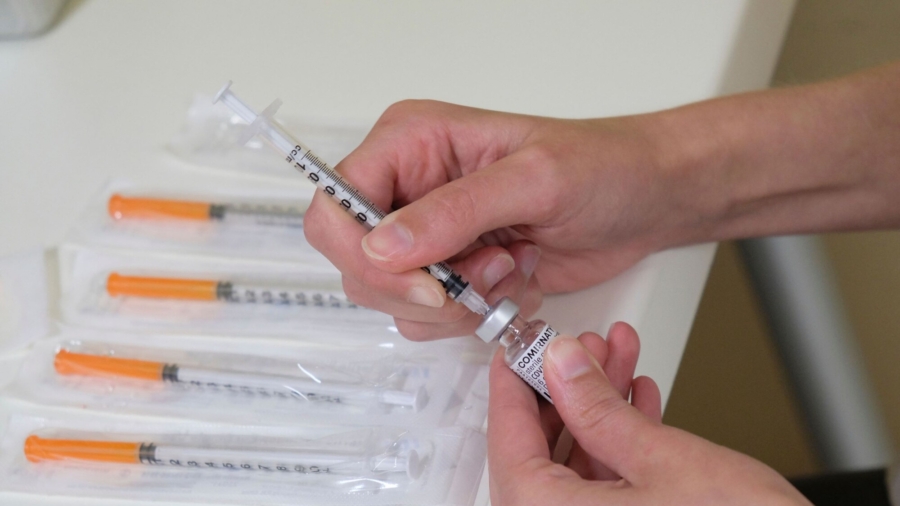The two main COVID-19 vaccines used in the United States are still protecting well against hospitalization and death, even with a new variant of the virus that causes COVID-19 circulating, a trio of new studies out Friday show.
At the same time, the effectiveness of the vaccines is down for the elderly, and the Johnson & Johnson jab showed much lower protection than the others, researchers found. And people who are not fully vaccinated have a much higher risk of needing hospital care or dying with COVID-19, the disease caused by the CCP (Chinese Communist Party) virus, the studies indicated.
One of them, in which researchers examined over 32,000 encounters at hospitals and urgent care centers across nine states between June and August, found vaccine effectiveness against hospitalization was 86 percent overall, though the difference was significant among adults under the age of 75 (89 percent) and those 75 or older (76 percent).
The same study found effectiveness was 95 percent among people who received a Moderna vaccine, compared to 80 percent among Pfizer-BioNTech vaccine recipients. Johnson & Johnson’s afforded the least protection, with it pegged at being 60 percent effective.
The researchers utilized data from the Centers for Disease Control and Prevention’s (CDC) VISION Network to examine the medical encounters, which had to have involved a COVID-19 test within 14 days before or 72 hours after the admission or encounter, and a COVID-19-like illness discharge diagnosis.
All three studies were published by the CDC and separated those who are fully vaccinated from those who are not.
Fully vaccinated means a person received both Pfizer or Moderna doses or the single-shot Johnson & Johnson dose, and at least two weeks elapsed since the receipt of the final shot of their regimen. Unvaccinated people were counted with partially vaccinated people.
In a second study, researchers conducted a “crude analysis” of surveillance data across 13 U.S. jurisdictions, 11 of which submitted hospitalization data. They evaluated over 600,000 COVID-19 cases from April through mid-July and found fully vaccinated persons accounted for 5 percent of cases, 7 percent of hospitalizations, and 8 percent of deaths, with the share of fully vaccinated in all three categories increasing over time.
The percentage of fully vaccinated persons suffering so-called breakthrough infections, or infections despite being vaccinated, was higher than expected, the researchers said. But they also said the analysis showed that people who were not fully vaccinated had a five times higher chance of contracting the CCP virus, a 10 times higher risk of getting hospitalized with COVID-19, and a higher than 10 times risk of dying with COVID-19.
Dr. Rochelle Walensky, the CDC’s director, highlighted the study in a virtual briefing Friday, saying the study showed that “vaccination works.”
“The bottom line is this: We have the scientific tools we need to turn the corner on this pandemic. Vaccination works and will protect us from the severe complications of COVID-19. It will protect our children and allow them to stay in school for safe in-person learning,” she said.
Walensky also acknowledged that officials are seeing more people in the hospital who have been vaccinated but maintained that “it’s still well over 90 percent of people who are in the hospital are unvaccinated.”
The CDC did not respond to a request for sourcing for the assertion.
Dr. Jeanne Marrazzo, director of the Division of Infectious Diseases at the University of Alabama at Birmingham School of Medicine, called the study important and said it shows that even as vaccines fail to protect as well against contracting COVID-19, they remain strongly protective against hospitalization and death.
The third study published Friday looked at vaccine effectiveness between Feb. 1 and Aug. 6 among U.S. veterans receiving hospital care at five Veterans Affairs medical centers.
Researchers found that vaccine effectiveness against hospitalization was 95 percent among adults 64 or older, but 80 percent among elderly persons 65 and up. They found little difference in efficacy before and after the Delta variant became prominent and stronger protection from the Moderna jab versus the Pfizer shot. Both are built on messenger RNA, or mRNA, technology.
“These findings support current evidence that COVID-19 mRNA vaccines are highly effective in preventing COVID-19–associated hospitalization and reinforce the importance of vaccination, including among veterans, who are at high risk for COVID-19 hospitalization because they are older and have a higher prevalence of underlying medical conditions compared with persons in the general U.S. population,” researchers wrote.
From The Epoch Times


